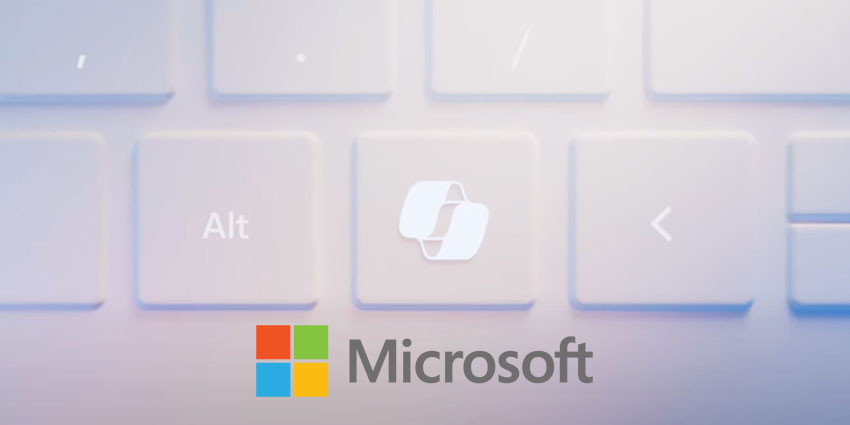Microsoft is releasing Windows keyboards that will include a key for Copilot — representing the first major change to its keyboard design in 30 years.
As part of Microsoft’s campaign, in which it described its intention for 2024 to be the “year of the AI PC”, a new Copilot key will ship on various new PCs and laptops designed by Microsoft’s partners. The key will offer immediate access to Microsoft’s AI-powered productivity assistant, Windows Copilot, with a single button press.
The key will be located between the “Alt” and left arrow keys on the new keyboards, replacing the Windows menu key, although the placement will differ by original equipment manufacturer (OEM) across Microsoft’s partner ecosystem and across various markets.
Yusuf Mehdi, Executive Vice President, Consumer Chief Marketing Officer at Microsoft, wrote in the official announcement:
We believe it will empower people to participate in the AI transformation more easily. The Copilot key joins the Windows key as a core part of the PC keyboard, and when pressed, the new key will invoke the Copilot in Windows experience to make it seamless to engage Copilot in your day-to-day.”
The new key signals the first change to the PC keyboard since the Windows key was added in 1994.
Pushing the Copilot key initiates the Windows Copilot that’s currently built into Windows 11, launching a chatbot that can respond to prompts or process actions within Windows. There is currently no reference to how the key might function with the enterprise-targeting, subscription-based 365 Copilot, with its own unique feature set distinct from Windows Copilot — if it does at all.
Because Copilot is not yet universally accessible across the globe, if a computer with the new keyboard cannot access the service, selecting the Copilot key will open the search bar instead.
Microsoft has not yet specified which OEMs will have the Copilot key, with further announcements being scheduled for next week;s Consumer Electronics Show. However, new Microsoft Surface devices will have the dedicated Copilot key moving forward.
“In this new year, we will be ushering in a significant shift toward a more personal and intelligent computing future where AI will be seamlessly woven into Windows from the system, to the silicon, to the hardware,” Mehdi added. “This will not only simplify people’s computing experience but also amplify it, making 2024 the year of the AI PC.”
Microsoft Going All In On Copilot in 2024
That the Copilot key is the first addition to a Windows keyboard in three decades highlights how seriously Microsoft is doubling down on AI and Copilot in particular.
It isn’t an announcement in isolation, however. Microsoft is demonstrably placing Copilot at the forefront across virtually every level of its hardware and software.
Since Christmas, never mind since Windows Copilot launched in September, Microsoft has released Android and iOS apps for Copilot. Functionally reminiscent of OpenAI’s ChatGPT mobile iteration, the Copilot mobile apps have a clean interface through which users have access can write prompts to ask questions, summarise text, draft emails, blogs and documents, and generate images by leveraging its DALL-E 3 image creator technology.
Additionally, Microsoft revealed it was expanding its Intelligent Recap capability for Teams Premium to Copilot users this week. Intelligent Recap was previously exclusive to Teams Premium subscribers but will become available for those who use Teams with Microsoft’s AI-powered Copilot chatbot to request an AI-honed summary of a past video meeting.
As well as wanting Windows PCs and laptops seamlessly compatible with Copilot to illustrate “the year of the PC”, Microsoft is also underlining Edge’s seamless operation with Copilot, pitching it this week as the “AI browser”.
If you thought Microsoft went in heavy with AI and Copilot in 2023, it’s increasingly looking like that was just the groundwork.
Consumer and enterprise response hasn’t quite been as emphatic, however. Copilot’s price point is high. One could argue that it is exorbitantly high in an age of shrinking tech budgets and ongoing market uncertainty, which has seen a reportedly limited uptake on 365 Copilot. Copilot costs $30 per user per month and is available for users with Microsoft 365 E3, E5, Business Standard and Business Premium plans.
That the product package currently has a 300-seat minimum has further alienated even those SMBs with the interest and, more importantly, finances to sign up.
There were industry rumours towards the end of 2023 that Microsoft hadn’t been bowled over by how its new flagship product had been received since that September launch.
The past week’s wave of announcements contextualises that frustration. Rather than withdrawing back until the business world and general public catch up to Microsoft’s opinion on AI’s potential, the tech giant’s aggressive centring of Copilot seemingly hopes to drag them both to its vision of an AI-supported future.
The ambition seems predicated on the belief that greater exposure to AI (and Copilot) for business leaders, workers, and the average person will result in their buying into what Microsoft is selling more enthusiastically — and with their wallets.
Microsoft has also mentioned that it is currently working on a Copilot subscription plan for SMBs, but what that will constitute and its price point remains up in the air for now. This could be a more practical solution for Copilot’s growth, especially if Microsoft is reluctant to drop the price of the current service for large businesses.







